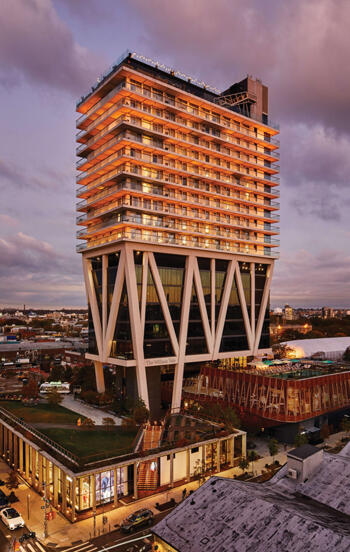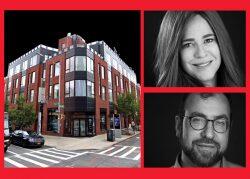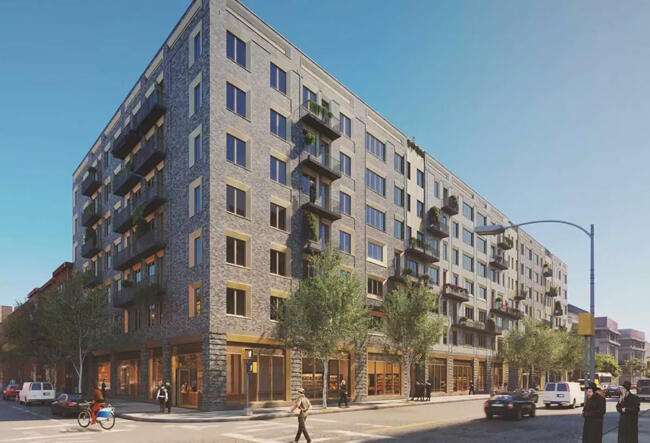
William Vale Hotel
It’s hard to hear yourself think at Broadway and Havemayer Street. A smoky mess of vans, pedestrians, bikes, buses and elevated subway tracks weaves together in a series of near-misses that always appears seconds from catastrophe.
Just above the Brooklyn intersection stands 266 Broadway, a nondescript office building home to another tangled web: Zelig Weiss’ Riverside Developers USA.
As his firm has grown, so has his maze of shell companies that own each other, transfer buildings to each other and obfuscate just what Weiss has built. Lotus Residences LLC, Z65 Realty, Marcy Hart LLC, Wythe Berry LLC and various others are knotted up inside that one Williamsburg office suite with a front-row seat to the J train.
Weiss incorporated Riverside in 2012, though his development history goes back at least to an eight-unit apartment building proposed in 2008. Weiss’ signature, a cursive “Z” that looks like a final heartbeat on a cardiogram, appears on mortgage documents for the property.
His portfolio ranges from small multifamily apartments and a niche hotel catering to Orthodox Jews to the William Vale Hotel, a towering achievement that one Brooklyn commercial broker called “the coolest building in Williamsburg.”
Like many Hasidic developers, Weiss moves in silence, at least to the secular world. No confirmed pictures of him exist online, and even in insular Yiddish-language chat rooms favored by tech-using Hasidim, Weiss is little more than a whisper. (It could be that he uses a different name within his community, a common practice for Hasidic businessmen who engage with the secular world for work.) He didn’t respond to interview requests.
Weiss embodies the two Williamsburgs that have emerged during its two decades of gentrification. A devout man who brought luxury to the world’s hipster capital, he personifies the standoff between development and destruction of the old Williamsburg. But as the neighborhood continues its astronomical growth, even builders with Weiss’ deep connections to the community are under siege.
Foreclosure looms for several trophy properties built by Williamsburg’s Hasidic developers. Weiss’ problem is different, but still vexing: He is at loggerheads with his longtime partner and battling for control of the Brooklyn castle that put him on the map.
“I can’t be your partner like this”
The William Vale wasn’t the first luxury hotel built in Williamsburg, but when it opened in 2016, it brought a new level of sophistication to the artsy enclave’s nascent hospitality scene. The 21-story building towers over the warehouses and apartments nearby. Its rooftop bar stands so tall and so close to Manhattan that it seems like visitors could throw a stone into the East River from their tables.
“It’s something taken out of South Beach and planted in the middle of Williamsburg,” said Daniel Lebor, a partner at Brooklyn commercial brokerage TerraCRG.
To build the uber-modern hotel and office property, Weiss partnered with Yoel Goldman’s All Year Holdings. In an affidavit, Weiss said he handled development while Goldman took care of financing.
Weiss now heads the William Vale’s operations through another one of his firms, Espresso Hospitality. The company also operates the Condor Hotel at 56 Franklin Avenue, another Weiss co-development, but the William Vale was a major step up. “You could tell he really just took pride in the management and the operations,” said Lebor, who once toured the hotel with Weiss.
Weiss was energetic and upbeat on their tour, showing off the Vale’s suites, restaurants and sweeping Manhattan views. He brought on Andrew Carmellini, a James Beard award–winning chef, to oversee a smorgasbord of food and drink at the hotel’s eateries. Mister Dips, a 1974 Airstream trailer parked at the 15,000-square-foot public park on the Vale’s second floor, highlights the inventive, trendy streak that touches every inch of the hotel.
“I think they were very intentional in the curation of the tenants that they put in there, especially on the ground floor,” Lebor said.
With exquisite timing and attention to detail, Weiss and Goldman built arguably the hottest property in the hottest borough. “Their biggest problem,” said Lebor, “is not enough elevators.”

But even as the hotel remains buzzy, the marriage behind it has been careening off a cliff.
Weiss and Goldman first sought a resolution outside the court system. On Feb. 21, 2019, the two signed a shtar, the Hebrew contract agreeing to enter arbitration before a rabbinical court. Each would choose one arbitrator, and those two would then name a third to serve as something akin to the chief justice.
Under the shtar, the parties had 12 weeks to settle their disagreements over the Vale and Rose Castle, which ranged from who would make multimillion-dollar mortgage payments to who would pay dewatering fees.
The dispute wasn’t just about dividing responsibilities but about Weiss’ habitual secrecy. Goldman demanded more information about the finances of the William Vale, whose business decisions Weiss largely controlled.
As negotiations dragged on past the deadline, bad blood persisted.
“I can’t be your partner like this,” Goldman texted Weiss that August, “not to be able to know what’s the balance in the accounts.”
The arbitration ostensibly ended in September 2019 with a ruling that, among other things, required Weiss to give Goldman monthly copies of the hotel’s bank statements. But Weiss didn’t accept the settlement, and sued in secular court to have it nullified. In his petition to the court, Weiss attacked the ruling from every angle: it missed its deadline, his arbitrator tried to resign, the lead arbitrator wasn’t qualified to give legal opinions. A New York state judge sided with Weiss.
With their disagreements unresolved, the William Vale’s developers ended up back in secular court this June, with the fate of their prized hotel hanging in the balance.
Read more


War against the artists
Fleeing the Holocaust, Brooklyn’s Hasidim arrived in Williamsburg haunted by the destruction of their eastern European homes. From the start, real estate took on an almost spiritual importance. As the community solidified and spread across the neighborhood, it developed a love-hate relationship with the business that can be at once fortifying and destructive.
“Real estate savvy has been one of the handful of things that allowed this community to survive and thrive in Williamsburg,” said Nathaniel Deutsch, author of A Fortress in Brooklyn: Race, Real Estate, and the Making of Hasidic Williamsburg.
From the moment they stepped foot in Williamsburg, Rebbe Yoel Teitelbaum and his followers set about building a kehile kedosha, or “holy community,” a goal not unlike John Winthrop’s Puritan “city upon a hill.” Over the course of two decades, Hasidim built their own congregations, schools and shops, creating what one Israeli newspaper called a “fortress of Judaism in the heart of the city,” according to Deutsch.
Then came the hipsters.
Starting in the late 1990s and early 2000s, anti-gentrification Hasidim launched “the war against the artists.” As secular creatives began moving closer to the Satmar enclave, activists cast the battle to preserve Williamsburg’s seclusion as an apocalyptic struggle. In a 2003 political cartoon published in the Satmar newspaper Der Yid, two planes labeled “artistn” (Yiddish for hipsters or artists) crash into Williamsburg beneath a drawing of the 9/11 attacks.
But as much as real estate threatened the parallel world Hasidim had built, it was fundamental to the community’s survival. According to a 2020 Pew Research Center survey, roughly a quarter of American Orthodox Jews report a family income less than $50,000 a year. Financially successful community members are expected to support the less fortunate, and in Williamsburg’s Hasidic community, many of the most charitable figures work in real estate.
It’s not just big players like Weiss who make a living shaping the skyline. The industry employs Hasidic truckers, lumber workers, plumbers, mortgage brokers, clerical workers and more. Women join the businesses.

Rose Castle
“The value of real estate to the community goes way beyond the developers or the landlords,” said Deutsch.
As wealthy, secular money continues to pour into Williamsburg, developers looking to succeed in the neighborhood often have to cater to the boozy brunch set. And even as some hope to stop the slow creep of displacement, others see it as inevitable. “If we don’t develop it, then other people will,” goes the thinking, according to Deutsch.
It sets people like Weiss in the middle of a widening chasm. Weiss won’t eat a cheeseburger, but people flock to the Vale’s food truck to try the griddle burger with smoked bacon and pepper jack. And instead of losing the fortress in Brooklyn altogether, Hasidic developers can re-route the fruits of gentrification back into their community.
Take Weiss’ apartment project at 35, 43 and 49 Skillman Street. Built along the southern border of Williamsburg where the Hasidic stronghold meets Bedford-Stuyvesant, the long brick apartment buildings feature 48 residential condos. The units were largely sold to local buyers in the mid-2010s at a median price of just $321 per square foot, according to data from PropertyShark, even as Brooklyn home prices soared. By comparison, apartments in nearby Clinton Hill have traded for north of $900 per square foot since 2017.
Two decades in, the war against the artists “ended with neither victory nor defeat,” Deutsch writes. Instead, a constant state of negotiation persists. The Hasidic community loses ground to the artists with projects such as the William Vale, but uses that economic growth to fortify itself with housing like the Skillman Street apartments.
“You make me feel like a thief”
For much of his career, Weiss managed to steer clear of the kind of public legal spats that trail brasher developers like shadows. But as his partnership with Goldman unravels, Weiss is fighting on multiple fronts to preserve his stake in the William Vale.
Weiss and Goldman’s All Year are locked in a court battle that is byzantine to the extreme, a reflection of the tangled corporate structures and opacity behind their hotel. And if All Year’s restructuring team is to be believed, Weiss’ secrecy and interlocking LLCs aren’t just useful for throwing off nosy journalists. Weiss’ former partners allege he is cutting out his longtime associate and enriching himself while skipping lease payments during the pandemic.
It’s not just disgruntled partners: Lenders, too, complain about Weiss’ opaque finances. In 2017, All Year tapped into the Tel Aviv Stock Exchange to help finance the William Vale, issuing bonds secured by the hotel. The offering allowed All Year to lend $166 million to Weiss and Goldman’s shell company, Wythe Berry Fee Owner LLC, which owned the fee interest on the William Vale.
To appreciate just how Escheresque Weiss can make his corporate arrangements, consider that he owns substantial portions of both the plaintiff and the defendant in the lawsuit. Wythe Berry Fee Owner LLC, a shell company that Weiss partially owns, is suing Wythe Berry LLC, another shell that he partially owns. A kind of corporate ouroboros, if you will.
According to All Year and the Israeli bondholders, Weiss stopped making lease payments on the Vale in February, citing pandemic hardship, even as two LLCs attached to the lessee received more than $7 million in PPP loans. Some $3.7 million of that government windfall was approved in March 2021, a month after the first missed payment, according to ProPublica’s PPP loan database.
In a letter this April declaring the hotel’s lease in default, Mishmeret Trust Company, the trustee of the Israeli bondholders, complained that it has been kept in the dark about critical financial information. Mishmeret offered to work out a consensual remedy for the alleged default, but only if Weiss provided balance sheets, rent schedules, management agreements, bank statements, even chef compensation.
“We note that this information has been requested multiple times,” Mishmeret writes, “but thus far no meaningful information has been provided.”
Weiss contends that he has been perfectly transparent. When Goldman sought information about the William Vale and Rose Castle during their arbitration, Weiss responded with surprise. “I don’t understand, you make me feel like a thief, you have all P&L’s [profit and loss statements] you can figure it all out yourself,” he texted Goldman.
While his grasp on the Vale was under attack at home, Weiss was looking abroad to tighten it. In October, he offered to buy out Mishmeret and All Year’s stakes in the hotel. Backed by $155 million in financing from Ohana Real Estate Investors, a Bay Area hotel investment firm, Weiss sought to pay the balance on the bondholders’ loan to achieve total control at the Vale.
Mishmeret balked at Weiss’ offer, citing a lack of details and the ongoing litigation to remove him from the property. Instead, on Oct. 26, the bondholders accepted a joint offer by Monarch Alternative Capital and Richard Wagman’s Madison Capital. Mishmeret is now drafting final terms for the deal.
The two already owned around 11 percent of the Series C bonds in All Year, secured by the William Vale, and offered $155 million, or 86 percent of total principal, for the remainder of the debt and collateral. Monarch didn’t respond to a request for comment and a member of Madison Capital declined to comment.
